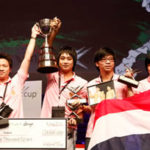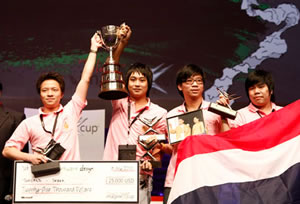
An interface that allows hearing-impaired people to communicate with others using an augmented-reality environment took home the grand prize of $25,000 in the eighth annual Imagine Cup Worldwide Finals in Poland, a prestigious international programming contest for high school and college students.
Team Skeek, a team of university students from Thailand, was responsible for the project, which also took first place in the software design category.
The winning project, eyeFeel, allows hearing-impaired people to communicate with others using an augmented-reality environment that combines speech and face recognition, converts it to English from text, and generates virtual conversation text balloons and sign language animation in real time.
“We wanted to implement something that would have a unique impression on the user and also be fun to use,” said Pichai Sodsai of team Skeek, who attends Kasetsart University. “We dared to dream and worked hard to make it come true.”
This year’s Imagine Cup, sponsored by Microsoft Corp., began with a field of more than 325,000 high school and university students representing more than 100 countries and regions and culminated with a weeklong celebration in Warsaw. During the week, students demonstrated their real-world solutions to challenges using Microsoft products and competed for cash prizes totaling $240,000 across five competition categories and six awards. This year’s projects primarily focused on solving challenges in education, health care, and the environment.
“We have a dream that all students will be equal in the classroom,” said team member Pichai Sodsai. “That’s why we built eyeFeel.
[field name=iframe]
Team Skeek said they will keep working on eyeFeel to bring it to market. Currently, eyeFeel only supports English, so the team’s next step is to embed Thai-language support.
Team SmarterME from Taiwan, the winning team in the Embedded Development category, wants to help consumers keep an eye on power-hungry appliances. The team developed its Smarter Meter project after one of its members received a sky-high electricity bill, said Yi-Sheng Lai, a student at National Chiao Tung University.
“After that, we were always trying to reduce our power consumption,” he said. “We realized having a single meter would help track a power footprint. That’s how we came up with the idea for the Smarter Meter.”
Smarter Meter provides detailed power consumption information to users. At a glance, homeowners can see what appliances are responsible for the bulk of their electricity use, which team members say will help people reduce their energy use and save money. The team won $25,000.
Also winning $25,000, team By Implication from the Philippines won the Game Design category for its game, Wildfire. Wildfire is a video game about saving the world through social action and volunteerism, says Philip Cheang, a student at Ateneo de Manila University. In the game, players take on rampant poverty, gender inequality, and environmental degradation with the hope of defeating those enemies.
Weiqiu Wen, of Huazhong University of Science and Technology, won the IT Challenge and a cash award of $8,000. The IT Challenge calls on competitors to develop, deploy, and maintain their own IT systems. This year’s competition asked participants to come up with a system that kept power consumption to a minimum.
Team Mirror Vita won $8,000 for the Digital Media category with their project “For Kids in the Future.” Filmed and edited over a 30-hour period, the animated short video tells children that they have the power to change the world, says Ching-Cheng Su, a student at National Taipei University of Technology.
“These student projects are sophisticated technology accomplishments that highlight the incredible things that can happen when inspired ideas and the will to make them happen come together,” said Jean-Phillippe Courtois, president of Microsoft International. “With their passion and the assistance of technology, these young adults can and will affect the future.”
In addition to the competition categories above, the Imagine Cup included six achievement awards. These six awards provided more opportunities for students to win cash, prizes, and a trip to Poland. Three U.S. teams received achievement awards.
Team Note-Taker, featuring students David Hayden and John Black from Arizona State University, received first place in the Touch & Tablet Accessibility category for an application that allows low-vision users to view streaming video of a classroom presentation while, at the same time, taking notes in a split-screen interface with Microsoft OneNote.
Team OneView, featuring students Shaun Kane and Kristen Shinohara from the University of Washington, received second place in the Touch & Tablet Accessibility category for a Tablet PC-based application that enables students with varying abilities to collaboratively create, read, and edit diagrams. OneView provides a synchronized multimodal interface (visual, audio, and text) that allows each student to use his or her preferred interface mode when collaborating with other students.
Team Beastware, featuring high school students Christian Hood and Eric Lo from the Advanced Technologies Academy in Nevada, received first place in the Windows Phone7 “Rockstar” category for a two-dimensional game that involves the player controlling a machine that destroys other machines by using the mobile phone’s accelerometer.
Registration for the 2011 Imagine Cup—to be held New York, the first time the United States is hosting the competition—should begin soon. Students interested in participating will be able to register here.
Links:
- Student programmers solve real-world challenges - July 12, 2010
- Computers make strides in recognizing speech - June 25, 2010
- On new iPhone, a mystery of dropped calls - June 25, 2010
